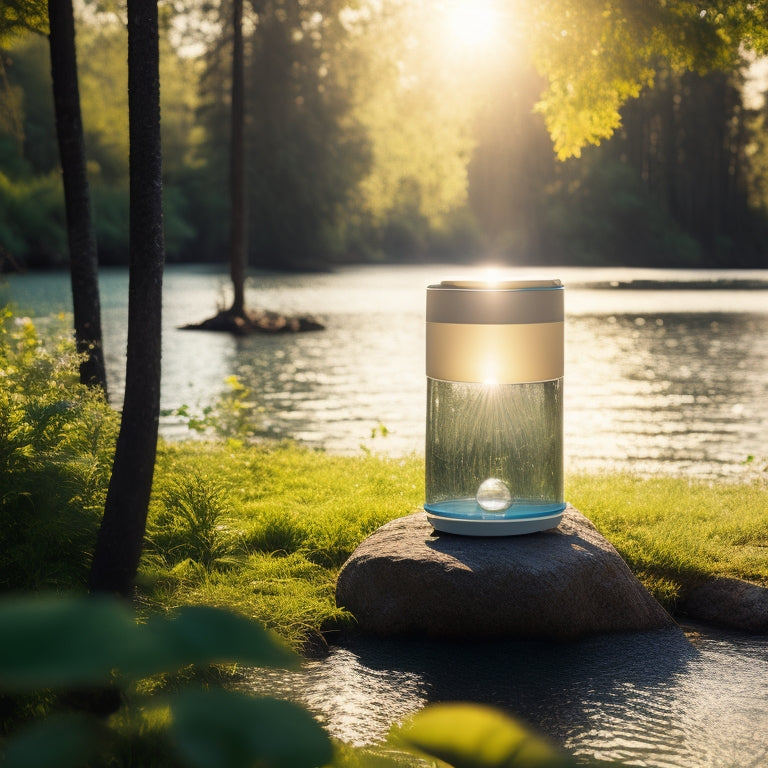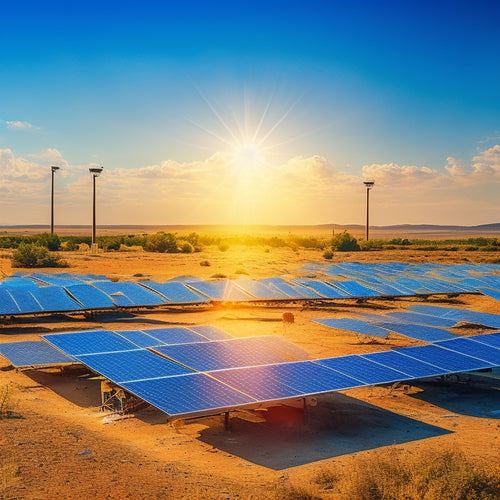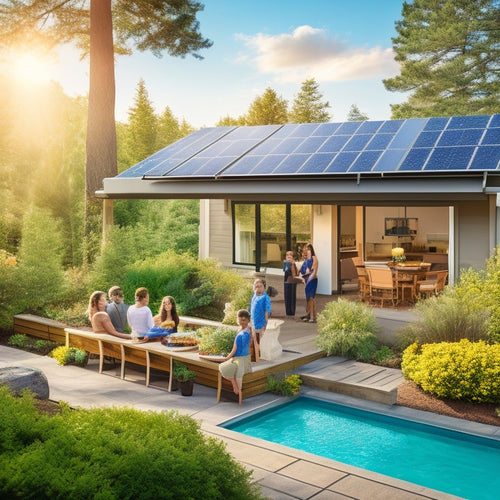
What Makes Solar Water Purifiers More Efficient
Share
Solar water purifiers achieve high efficiency through advanced technology and sustainable practices. They employ solar energy, reducing both operational costs and reliance on conventional power sources. Enhanced absorption materials and superior heat retention techniques optimize energy conversion, ensuring effective purification. Additionally, their design minimizes maintenance needs, further lowering long-term expenses. The eco-friendly nature of solar purifiers also contributes to reduced carbon footprints, supporting resource conservation. By considering water quality and innovating filtration technologies, these systems enhance treatment effectiveness. Exploring these aspects can provide deeper understanding into what truly makes solar water purifiers a smart choice.
At a Glance
- Solar water purifiers utilize renewable solar energy, reducing reliance on costly electricity and lowering long-term operating expenses.
- Advanced UV technology effectively eliminates 99.9% of bacteria and pathogens, enhancing water safety and quality.
- Innovative materials with superior thermal conductivity improve energy absorption and heat retention, boosting purification efficiency.
- Reduced maintenance requirements and fewer mechanical failures contribute to lower operational costs and increased durability.
- Eco-friendly design minimizes harmful byproducts, supporting sustainable practices and promoting environmental conservation.
Cost-Effective Water Purification Solution
When considering solar water purifiers, you'll find that their low operating expenses make them an economically viable choice.
These purifiers effectively employ UV-C LED technology to target pathogens, ensuring safe drinking water without incurring high energy costs.
Over time, these systems can lead to significant long-term savings, as they reduce reliance on traditional energy sources and ongoing maintenance costs.
Analyzing these factors helps you understand the financial benefits of investing in solar purification technology.
Low Operating Expenses
Solar water purifiers stand out as a cost-effective solution for water purification, considerably reducing operating expenses compared to traditional methods. Their energy efficiency is an essential factor in this equation. By utilizing solar energy, these systems eliminate reliance on costly electricity or fuel sources, which can accumulate significant expenses over time.
Moreover, the maintenance requirements for solar water purifiers tend to be lower. Traditional purification systems often necessitate frequent repairs and replacements, driving up costs. In contrast, solar purifiers generally have fewer moving parts, reducing the likelihood of mechanical failures. This simplicity not only lowers maintenance costs but also means you can spend less time and money on upkeep.
Additionally, the absence of chemical additives in solar water purification further mitigates expenses. Unlike other methods that require purchasing chemicals regularly, you can rely solely on sunlight, a free and abundant resource.
Long-Term Savings Benefits
Investing in solar water purifiers offers considerable long-term savings benefits, making them a cost-effective solution for water purification. By utilizing solar energy, these systems dramatically reduce your reliance on traditional electricity sources, leading to lower utility bills. Over time, this translates into substantial financial benefits, especially for households or communities facing high energy costs.
Moreover, the initial investment in a solar water purifier can yield impressive investment returns. Unlike conventional purification methods that often incur ongoing expenses for maintenance and consumables, solar systems typically require minimal upkeep. With fewer moving parts and no need for chemical treatments, your long-term costs remain low.
Additionally, as the technology matures and becomes more efficient, you're likely to see even greater returns on your investment. The durability and longevity of solar water purifiers further enhance their appeal, ensuring that you won't need frequent replacements.
Eco-Friendly Water Treatment Method
When considering eco-friendly water treatment methods, solar water purifiers present an engaging renewable energy source.
They employ advanced UV technology to eliminate 99.9% of bacteria and pathogens, ensuring the production of safe drinking water in a sustainable manner.
This approach not only conserves resources but also reduces reliance on conventional energy-intensive purification processes.
Renewable Energy Source
Utilizing the sun's energy offers a revolutionary approach to water purification, positioning solar water purifiers as a viable eco-friendly treatment method. By capturing solar energy, these purifiers align with sustainable practices that not only address water quality issues but also contribute to energy independence. You can appreciate the efficiency of this technology as it converts sunlight into a powerful resource for clean water.
| Aspect | Benefits |
|---|---|
| Energy Source | Renewable, abundant, and free |
| Operational Cost | Low, as it requires minimal maintenance |
| Environmental Impact | Reduces carbon footprint |
| Accessibility | Can be deployed in remote areas |
| Water Quality | Effectively purifies without chemicals |
Minimal Environmental Impact
Solar water purifiers stand out not just for their efficiency in providing clean water but also for their minimal environmental impact. By utilizing solar energy, these purifiers align with sustainable practices that reduce reliance on fossil fuels. This shift not only conserves natural resources but also helps mitigate greenhouse gas emissions, contributing to environmental conservation.
When you choose solar water purification, you're adopting a method that leaves no harmful byproducts. Unlike traditional water treatment systems that often require chemical additives or extensive energy consumption, solar purifiers operate purely on renewable energy. This means you're supporting a process that prioritizes ecological balance.
Moreover, the materials used in many solar water purifiers are often recyclable or biodegradable, further minimizing waste. This factor is essential in a world where plastic pollution and environmental degradation are pressing concerns.
In adopting solar water purification, you're not just ensuring access to clean water; you're making a conscious decision that promotes a healthier planet. This choice enables you to take an active role in encouraging sustainable practices and supporting environmental conservation efforts, ultimately leading to a more sustainable future for everyone.
Innovative Solar Collection Design
When considering innovative solar collection designs, enhanced absorption materials and the integration of smart technology play an essential role in maximizing energy capture.
Additionally, optimized heat retention techniques can greatly improve the efficiency of solar water purifiers.
Enhanced Absorption Materials
Innovative designs in solar collection are increasingly focusing on enhanced absorption materials to improve efficiency in water purification systems. By utilizing advanced composites and sustainable materials, you can greatly enhance the absorption efficiency of solar energy.
Material innovation plays a vital role, as these new materials often exhibit superior thermal conductivity, allowing for more effective energy conversion.
Incorporating high-performance absorption materials into your solar water purifier can lead to remarkable performance enhancement. For instance, materials engineered for peak light absorption can trap more solar energy, ensuring that less is lost during the conversion process. This is particularly important in purification technology, where maximizing energy input directly correlates with the effectiveness of water treatment.
Moreover, the shift toward environmental sustainability emphasizes the need for materials that not only perform well but also minimize ecological impact. By selecting materials that are both efficient and sustainable, you're contributing to a greener future while enhancing the operational capabilities of your solar water purification systems.
Ultimately, investing in enhanced absorption materials represents a substantial step forward in achieving efficient, effective, and environmentally friendly water purification solutions.
Optimized Heat Retention
Optimized heat retention is vital for enhancing the efficiency of solar water purifiers. When you focus on this aspect, you improve heat transfer efficiency, allowing the system to maintain higher temperatures for extended periods. This is essential because the effectiveness of solar purifiers relies on sustained heat to guarantee the purification process works at its best.
One of the key strategies for achieving optimized heat retention involves employing advanced thermal insulation techniques. By using materials that have low thermal conductivity, you can considerably reduce heat loss to the environment. For instance, incorporating vacuum insulation or aerogel can create barriers that keep the collected heat within the system, thereby maximizing temperature retention.
Additionally, the design of the solar collector itself plays an important part. By maximizing surface area and confirming the collector is oriented to capture sunlight effectively, you enhance the initial heat gain.
When combined with efficient thermal insulation methods, the overall performance of the solar water purifier improves.
Selecting Based on Water Source
When selecting a solar water purifier, consider the characteristics of your water source, as these will greatly influence the system's efficiency.
Different sources, such as rivers, wells, or municipal supplies, may contain varying types and concentrations of contaminants.
For instance, solar-powered purification systems are particularly effective in remote areas where access to clean water is limited, providing a reliable solution to treat water from diverse sources solar-powered purification systems.
Water Source Characteristics
Selecting the right water source is essential for maximizing the efficiency of solar water purifiers. When you consider potential sources, evaluate the water quality thoroughly. High turbidity or excessive contaminants can impede purification processes, leading to less effective results. You'll want to confirm that the water source has minimal impurities to enhance the purification efficiency.
Additionally, think about seasonal availability. Some sources may be abundant during certain times of the year while dwindling in others. For instance, rivers or streams might experience fluctuating water levels, affecting the quantity and quality of water available for purification. An inconsistent water supply can disrupt your purification routine, making it hard to rely on that source.
Ultimately, prioritizing a stable, high-quality water source will guarantee that your solar water purifier operates at its best. Evaluating both the water quality and seasonal availability enables you to make informed decisions, promoting efficiency and sustainability in your water purification efforts.
This proactive approach not only maximizes the functionality of your solar system but also aligns with your desire for independence in accessing clean water.
Contaminant Types Consideration
Different types of contaminants in your water source can greatly impact the effectiveness of solar water purification. Understanding these contaminant types is vital for optimizing purification efficiency. Common contaminants include pathogens, heavy metals, and organic pollutants, each requiring different treatment approaches.
For instance, if your water source is a river or lake, it's likely to have biological contaminants like bacteria and viruses. In this case, solar purifiers can effectively utilize UV radiation to neutralize these pathogens.
On the other hand, if you're dealing with groundwater contaminated by heavy metals, the standard solar purification methods may fall short. Heavy metals require advanced filtration techniques or chemical treatments, which solar purifiers may not provide.
Moreover, organic pollutants, such as pesticides, can also complicate purification processes. These substances often need specific adsorption or advanced oxidation processes, which aren't always achievable through solar methods alone.
As a result, when selecting a solar water purifier, consider the specific contaminant types present in your water source. This careful selection will enhance your system's purification efficiency and guarantee you achieve the clean, safe water you desire.
Higher Purification Rates Achieved
To achieve higher purification rates, you need to contemplate innovative filtration technologies integrated into solar water purifiers.
These advancements not only enhance efficiency but also address various contaminants effectively.
Innovative Filtration Technologies
Recent advancements in filtration technologies have considerably enhanced the efficiency of solar water purifiers, achieving higher purification rates than ever before. Innovations like membrane technology and nanofiltration systems are at the forefront, allowing for the removal of contaminants with extraordinary precision.
These systems employ advanced oxidation processes, breaking down pollutants at a molecular level while ensuring that the water retains essential minerals.
Bio-inspired designs have emerged as an intriguing approach, mimicking natural filtration processes to improve performance. Hybrid solutions that combine various filtration methods—such as UV integration with traditional techniques—are also gaining traction, further elevating filtration efficiency.
The introduction of smart sensors allows for real-time monitoring of water quality, ensuring that you always have access to safe drinking water.
Modular systems provide flexibility, enabling you to scale the filtration capacity according to your needs while using sustainable materials that minimize environmental impact.
Frequently Asked Questions
Can Solar Water Purifiers Work in Cloudy Weather?
Yes, solar water purifiers can work in cloudy conditions, but their efficiency decreases. Factors like sunlight intensity and duration impact performance. You'll find optimization methods essential for maximizing effectiveness under less ideal weather scenarios.
How Long Does It Take to Purify Water Using Solar Technology?
On average, solar water purifiers can take 4 to 6 hours for effective purification. Your results depend on solar efficiency, sunlight intensity, and water volume, impacting overall purification time considerably. Choose wisely for ideal outcomes.
Are Solar Water Purifiers Portable for Outdoor Use?
Yes, solar water purifiers often include design features that enhance portability options. Their lightweight construction and compact size make them ideal for outdoor use, allowing you to easily carry them during camping or hiking trips.
What Maintenance Is Needed for Solar Water Purifiers?
"An ounce of prevention is worth a pound of cure." You should regularly inspect your solar water purifier system and clean the filters to maintain efficiency and guarantee safe, clean drinking water, enhancing your outdoor freedom.
Can Solar Water Purifiers Remove All Types of Contaminants?
Solar water purifiers excel at removing many contaminant types, but they don't eliminate all. Their purification efficiency varies based on specific contaminants, so understanding your water source helps you choose the right purification method.
Explore More
To sum up, solar water purifiers stand out as an efficient solution for clean drinking water. By utilizing renewable energy, they offer a cost-effective and eco-friendly alternative to traditional methods. Remember, "necessity is the mother of invention"; as you evaluate your water source and purification needs, consider these innovative designs that can enhance purification rates. Embracing these technologies not only benefits you but also contributes to a sustainable future for our planet.
Related Posts
-

Building an Emergency Backup Solar Power System in 5 Essential Steps
Building an emergency backup solar power system involves five key steps. First, assess your daily energy needs to ide...
-

What Happens Without a Charge Controller in Solar Panels
Without a charge controller in your solar panel system, you risk overheating batteries due to overcharging, which can...
-

Top-Rated Home Solar Power Kits for Achieving Energy Independence
Top-rated home solar power kits enable you to achieve energy independence by greatly cutting your energy costs. You c...


